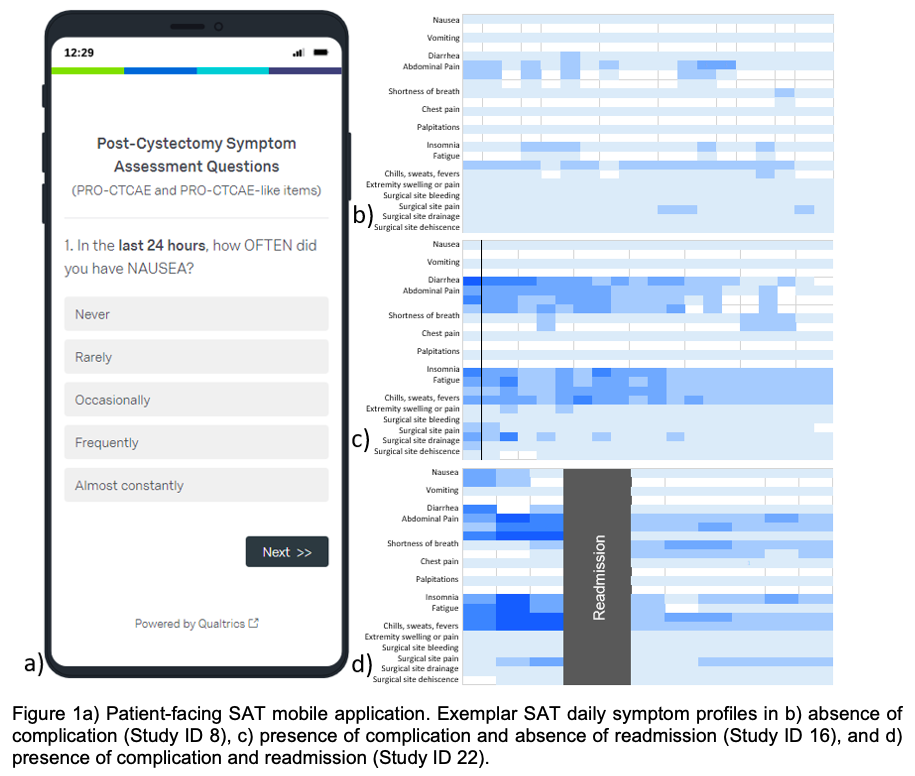Back
Poster, Podium & Video Sessions
Best Poster Award
MP03: Bladder Cancer: Invasive I
MP03-16: Feasibility, Usability and Utility of a Remote Symptom Assessment Tool After Radical Cystectomy
Friday, May 13, 2022
7:00 AM – 8:15 AM
Location: Room 222
Heather Huelster*, Logan Zemp, Brian Gonzalez, Heather Jim, Michael Poch, L Robert Gore, Scott Gilbert, Tampa, FL

Heather L. Huelster, MD
H Lee Moffitt Cancer Center & Research Institute
Poster Presenter(s)
Introduction: Mobile health technology and integration of patient-reported outcomes (PROs) into clinical care has potential to transform how patients communicate with care teams. Though PRO symptom assessment and management has been shown to improve outcomes in ambulatory care settings, few studies have examined PROs from remote symptom assessment after major cancer surgery.
Methods: Relevant items from the NCI’s PRO version of the Common Terminology Criteria for Adverse Events (PRO-CTCAE) were adapted to capture common symptoms after radical cystectomy. Items were reviewed and vetted with nurses, surgeons, and NCI stakeholders. An app-based mobile symptom assessment tool (SAT) was developed and usability reviewed by patient and caregiver focus groups (N=10).Feasibility and usability was tested in prospectively accrued cystectomy patients (N=15) who completed daily SATs on an electronic tablet (Figure 1a) and wore Garmin biometric monitoring devices while recovering after hospital discharge. Retention, SAT completion, and usability was assessed. Clinical utility was explored by correlating daily PRO symptoms and biometric data to postoperative complications and readmission.
Results: Fifteen patients with a median age of 72 years completed the study during recovery from cystectomy. Eight (53.3%) patients experienced a complication, 11 (73.3%) had an unexpected healthcare encounter, and 2 (13.3%) required readmission. Patients completed a mean 78.2% daily surveys and the mean time required to complete each questionnaire was 152 seconds. All patients responded that they agreed/strongly agreed that the SAT was easy to use, and 9 (60%) stated that they thought it was a better way to communicate with the care team about symptoms. Heatmaps of daily SAT responses were clustered by outcomes and visually correlated with adverse recovery events (Figure 1b-d). A wearable Garmin monitor collected patient-generated health data including heart rate, activity, sleep, and stress metrics for a mean of 22.8 days per patient during the 30-day home recovery phase after cystectomy.
Conclusions: Remote symptom assessment is feasible after cystectomy and rated as highly usable by patients. PRO-CTCAE scores and biometric data may signal developing complications and help clinicians identify patients who may benefit from intervention.
Source of Funding: NA

Methods: Relevant items from the NCI’s PRO version of the Common Terminology Criteria for Adverse Events (PRO-CTCAE) were adapted to capture common symptoms after radical cystectomy. Items were reviewed and vetted with nurses, surgeons, and NCI stakeholders. An app-based mobile symptom assessment tool (SAT) was developed and usability reviewed by patient and caregiver focus groups (N=10).Feasibility and usability was tested in prospectively accrued cystectomy patients (N=15) who completed daily SATs on an electronic tablet (Figure 1a) and wore Garmin biometric monitoring devices while recovering after hospital discharge. Retention, SAT completion, and usability was assessed. Clinical utility was explored by correlating daily PRO symptoms and biometric data to postoperative complications and readmission.
Results: Fifteen patients with a median age of 72 years completed the study during recovery from cystectomy. Eight (53.3%) patients experienced a complication, 11 (73.3%) had an unexpected healthcare encounter, and 2 (13.3%) required readmission. Patients completed a mean 78.2% daily surveys and the mean time required to complete each questionnaire was 152 seconds. All patients responded that they agreed/strongly agreed that the SAT was easy to use, and 9 (60%) stated that they thought it was a better way to communicate with the care team about symptoms. Heatmaps of daily SAT responses were clustered by outcomes and visually correlated with adverse recovery events (Figure 1b-d). A wearable Garmin monitor collected patient-generated health data including heart rate, activity, sleep, and stress metrics for a mean of 22.8 days per patient during the 30-day home recovery phase after cystectomy.
Conclusions: Remote symptom assessment is feasible after cystectomy and rated as highly usable by patients. PRO-CTCAE scores and biometric data may signal developing complications and help clinicians identify patients who may benefit from intervention.
Source of Funding: NA


.jpg)
.jpg)